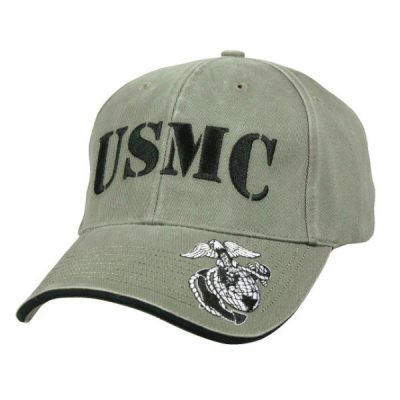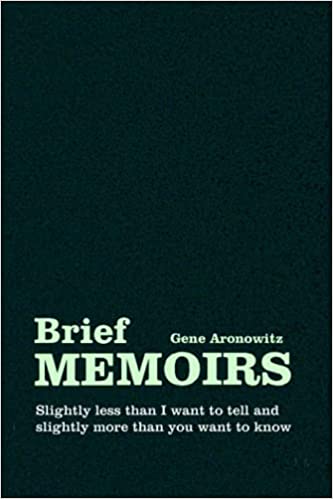The Marine Corps Cap

By Gene Aronowitz
In the 1950s, young men in the United States were required to register for the military draft, but the law provided for a student deferment, which would allow me to finish college before being called to serve. However, as described in my memoir “Academics,” I was in danger of flunking out and being drafted. I decided to drop out of school temporarily and join the reserves. That would require only six months of active duty rather than two years if drafted. My plan was to leave school right away so I could return before the following semester began. My timing had to be perfect.
I went to an Army recruiting station, but there were no openings for the reserves. I tried the Navy, but there were no vacancies there either. That left the Marine Corps, which was always looking for recruits, and they welcomed me. In February 1958, at the age of 20, I was sent a train ticket for transit to Parris Island (PI) in South Carolina. Two others from Wilmington, Delaware, my hometown, were on the same train. I could see that both were excited, picturing themselves like John Wayne in the popular film “The Sands of Iwo Jima.” However, I found the trip stressful, because I knew that about two years before, in April 1956, a recruit platoon at PI was marched to a swampy creek at night. Most walked along the creek bed but some drifted into deep water, fully clothed, with heavy boots. Six men drowned.
When the train arrived in South Carolina, a Marine Corps bus was waiting for us. When we arrived at PI, a drill instructor (DI) bounded onto the bus and started shouting insults and demands. We were herded into a large room where more screaming DIs were waiting for us. I had never been so confused and terrified. Their unnerving behavior lasted from that moment until the last few days of our 13-week stay on the Island. My experience included the following.
· instruction regarding Marine Corps history, customs, and core values
- marching in close formation
- hand-to-hand and bayonet combat training
- long hikes and runs
- physical training, including a demanding confidence course, which was composed of numerous obstacles that posed physical and mental challenges
- exposure to toxic gases
- water survival
- marksmanship training
- land navigation instruction and the much-feared “crucible,” a 54-hour, almost sleepless marathon that included combat assault, casualty evacuation, a more challenging confidence course, night infiltration, and a night march.
For me, the worst day was when we had to demonstrate that we had learned how to fire our rifles proficiently. We spent a week in marksmanship training, and, on qualification day, we tried to hit the targets with enough accuracy to score at least 180 points out of a possible 250. A score of 180 was passing, but just barely, like getting a D in school. The DIs had a lot riding on the outcome, making bets with the competing DIs, whose recruits all scored well. In our platoon, I was the only one who failed to qualify, getting a pitiful 179.
Beginning that day, the DIs were hyper-critical about my performance and referred to me as “Aronow-fuckin-witz.” However, I was very well prepared for many of the physical challenges, such as the strength and agility tests, the long hikes and runs, and water survival. One of our tests was jumping into the deep end of a swimming pool in full uniform, including boots and helmet, and getting out safely. I had no problem with that challenge, because of my background as a swimming instructor. By the end of training, the DIs seemed to have forgotten about my failure on the rifle range and treated me with the same disdain as they treated everyone else.
After graduating from that thirteen-week life-altering experience at PI, I spent the remainder of my six months of active duty undergoing infantry training at Camp Lejeune in North Carolina. This was a much different and less stressful experience than at PI since I was, at that point, considered a full-fledged Marine.
But the challenges at Camp Lejeune were physically arduous and often exhausting. We were quite active there, engaging in extremely calorie-consuming physical activities, including long hikes with full, heavy backpacks. In addition, I ate more moderately there than on PI, probably because of the reduction in stress level. I lost about 15 pounds during my time there.
What I learned at PI was the knowledge, discipline, individual combat, and fitness level required of a Marine. What I learned at Camp Lejeune was how to become combat-ready by practicing as a member of a team.
About three weeks before I finished active duty, I attended an outdoor movie and noticed that almost half the attendees were wearing combat uniforms with full backpacks. They were prepared to be deployed because of unrest in Lebanon. I was briefly concerned that the training unit of which I was a part might also be activated, but we weren’t. The goal of the Lebanese operation was to bolster its pro-Western government’s attempts to counter internal opposition and threats from Syria and Egypt. It is my understanding that those combat-ready Marines were deployed the next day and landed at Yellow Beach, four miles north of Beirut.
But not being deployed didn’t mean I was entirely safe at Camp Lejeune. High levels of toxic chemicals had seeped into its water supply because of a dry-cleaning solvent used there. Exposure to those chemicals presumably causes serious diseases, including cancers. Those who developed certain medical conditions after their stay at Camp Lejeune during that period can claim disability payments. I made a claim because I later developed prostate cancer. However, there was no evidence that those chemicals caused that condition, so I dropped my claim.
When I completed my active duty and left Camp Lejeune, I served for five and a half more years, one weekend per month and two weeks every summer. I felt fortunate that I was never activated and, therefore, never in combat.
Since being discharged in 1964, I have developed and maintained a deep affection for the Marines and much interest in what and how they are doing. I love to listen to the marches that are played by “The President’s Own” Marine Corps Band, which is considered the best in the world. I bought some of their CDs and videos and traveled to Washington to see them perform. While there, I visited the various war memorials on the National Mall. I made it a point to wear my Marine Corps cap, and lots of people nodded or waved, and many thanked me for my service. But that always made me feel a little uncomfortable. I never considered myself the kind of Marine those people may have imagined, one who put his life in jeopardy and experienced the deprivation associated with life in a combat zone. Rather, I accepted the title of weekend warrior, as reservists were often called. But I was proud to be a Marine. I had survived the most rigorous basic training of any branch of the United States military and with even more hardship than was customary because of my marksmanship fiasco.
I continue to wear my cap proudly. One day in April 2020, I wore it when I went into Lowes, a big box home maintenance and improvement store. Because of the Coronavirus crisis, I wore my face mask, rubbed in some of their hand sanitizer, covered the handle of the shopping cart with a cloth, and pushed it over to the section displaying the items I was looking for. There, stocking shelves, was a burly man with a “veteran” patch on his red store vest. He looked at my cap and shouted: “I see you’re a Marine.” I nodded, and he extended his bare hand toward me. I hesitated because of my concern about COVID-19, but I shook his hand anyway because I didn’t want to embarrass him. I also nodded toward his veteran patch to acknowledge his service as well. He was friendly and very helpful and even accompanied me to the checkout counter. We shook hands once again as I left.
As soon as I got to the car, I drenched my hands with sanitizer, amused by the thought that I didn’t even come close to getting killed while I was in the service, but wearing that Marine Corps cap might have easily done me in.


